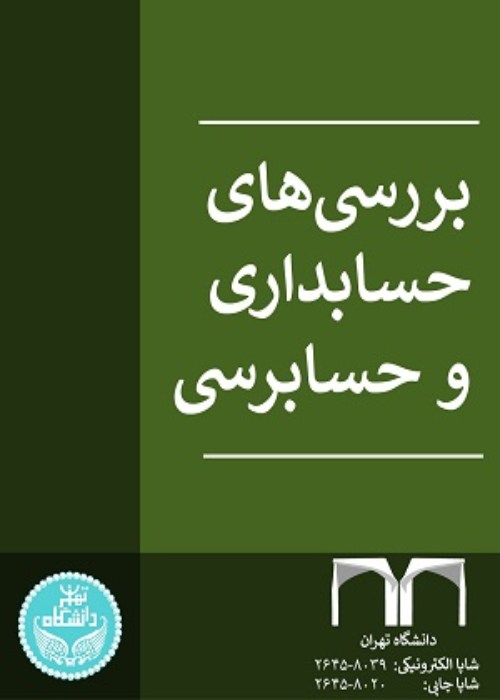A Model for Identifying Key Elements of Corporate Sustainability Reporting: Emphasizing Islamic Principles and Values
Author(s):
Article Type:
Research/Original Article (دارای رتبه معتبر)
Abstract:
Objective
Considering the importance of sustainability in Islam, Islamic companies can play an important role in sustainable development by adhering to sustainability requirements and sustainability reporting. In Islam, there are valuable concepts for sustainability. While some authors have explored corporate sustainability reporting from an Islamic perspective, a comprehensive model that incorporates Islamic teachings alongside conventional frameworks is yet to be developed. In this regard, this research aims to present a model for identifying the key elements of corporate sustainability reporting with an emphasis on Islamic principles and values to gauge the Islamic companies sustainability activities disclosure level, including Iranian companies.Methods
After identifying the primary elements of the model through a review of sustainability reports from a sample of Shariah-compliant companies in Malaysia and Indonesia, conducting an extensive literature review, and gathering expert opinions through thematic analysis, the fuzzy Delphi method was employed for further refinement. The statistical population in the implementation of the fuzzy Delphi method was sustainability reporting and Islamic finance experts who were selected based on purposive sampling and the identified initial elements were sent to them in the form of a questionnaire for screening in 2022.Results
In total, 203 indicators were identified through the review of sustainability reports of a sample of Shariah-approved companies in Malaysia and Indonesia, an extensive review of the literature, and soliciting opinions from experts using the thematic analysis method. Out of the total identified indicators, 158 indicators were related to conventional sustainability reporting standards and guidelines, and 45 indicators were related to companies' Islamic responsibility activities. Based on similarity, the indicators were placed in the form of 13 conventional components and four Islamic components. The components were also categorized in the form of four social, environmental, sustainability governance, and economic dimensions. In the social dimension, 84 indicators were identified which were classified into customer satisfaction, employee welfare, participation in the local community, and Islamic social responsibility activities components. The environmental dimension included 43 indicators classified into natural resource consumption management, pollution management, product and service innovation, and Islamic environmental responsibility activities components. The 46 identified indicators in the sustainability governance dimension were included in the components of sustainability reporting procedures, sustainability governance structure, shareholders' rights, and Sharia governance. The economic dimension also included 30 indicators classified into economic performance, indirect economic effects, supply chain management, the campaign against bribery and corruption, and Islamic economic responsibility activities components. In the screening stage using the fuzzy Delphi method, 21 indicators were removed and the model key elements were finalized in the form of 182 indicators, 17 components, and four dimensions. Conclusion
By validating the majority of the indicators identified in the model, it is evident that they are deemed significant from the perspective of the experts. In addition, the confirmation of the majority of Islamic indicators in each dimension of the model shows the importance of considering Islamic principles and values in completing the model elements. This research contributes to the body of knowledge on sustainability reporting and Islamic finance, offering a framework for Islamic companies to fulfill their obligations to God, stakeholders, and the environment.Keywords:
Language:
Persian
Published:
The Iranian Accounting and Auditing Review, Volume:30 Issue: 114, 2023
Pages:
684 to 724
magiran.com/p2697536
دانلود و مطالعه متن این مقاله با یکی از روشهای زیر امکان پذیر است:
اشتراک شخصی
با عضویت و پرداخت آنلاین حق اشتراک یکساله به مبلغ 1,390,000ريال میتوانید 70 عنوان مطلب دانلود کنید!
اشتراک سازمانی
به کتابخانه دانشگاه یا محل کار خود پیشنهاد کنید تا اشتراک سازمانی این پایگاه را برای دسترسی نامحدود همه کاربران به متن مطالب تهیه نمایند!
توجه!
- حق عضویت دریافتی صرف حمایت از نشریات عضو و نگهداری، تکمیل و توسعه مگیران میشود.
- پرداخت حق اشتراک و دانلود مقالات اجازه بازنشر آن در سایر رسانههای چاپی و دیجیتال را به کاربر نمیدهد.
In order to view content subscription is required
Personal subscription
Subscribe magiran.com for 70 € euros via PayPal and download 70 articles during a year.
Organization subscription
Please contact us to subscribe your university or library for unlimited access!



